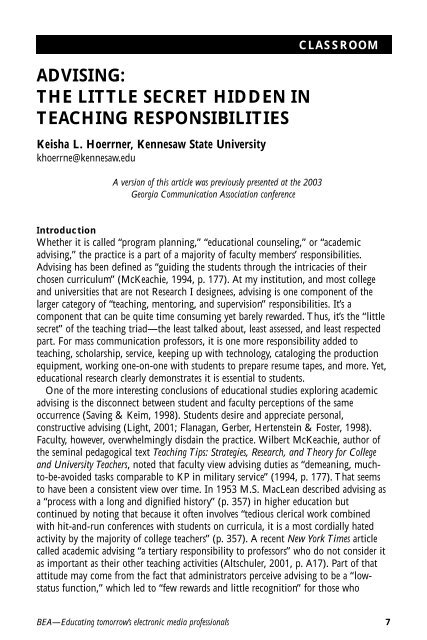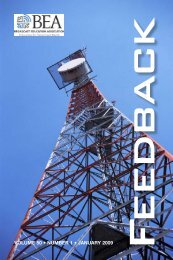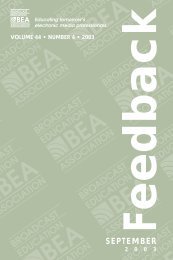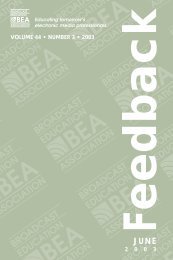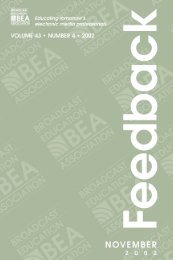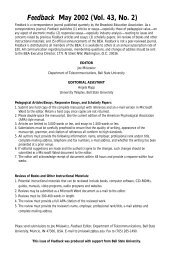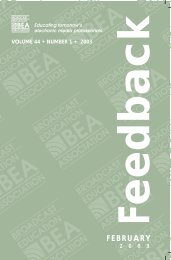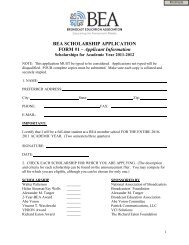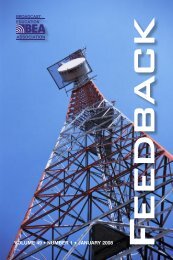APRILFeedback
Feedback April 2003 (Vol. 44, No. 2) - Broadcast Education ...
Feedback April 2003 (Vol. 44, No. 2) - Broadcast Education ...
- No tags were found...
You also want an ePaper? Increase the reach of your titles
YUMPU automatically turns print PDFs into web optimized ePapers that Google loves.
ADVISING:THE LITTLE SECRET HIDDEN INTEACHING RESPONSIBILITIESKeisha L. Hoerrner, Kennesaw State Universitykhoerrne@kennesaw.eduA version of this article was previously presented at the 2003Georgia Communication Association conferenceCLASSROOMIntroductionWhether it is called “program planning,” “educational counseling,” or “academicadvising,” the practice is a part of a majority of faculty members’ responsibilities.Advising has been defined as “guiding the students through the intricacies of theirchosen curriculum” (McKeachie, 1994, p. 177). At my institution, and most collegeand universities that are not Research I designees, advising is one component of thelarger category of “teaching, mentoring, and supervision” responsibilities. It’s acomponent that can be quite time consuming yet barely rewarded. Thus, it’s the “littlesecret” of the teaching triad—the least talked about, least assessed, and least respectedpart. For mass communication professors, it is one more responsibility added toteaching, scholarship, service, keeping up with technology, cataloging the productionequipment, working one-on-one with students to prepare resume tapes, and more. Yet,educational research clearly demonstrates it is essential to students.One of the more interesting conclusions of educational studies exploring academicadvising is the disconnect between student and faculty perceptions of the sameoccurrence (Saving & Keim, 1998). Students desire and appreciate personal,constructive advising (Light, 2001; Flanagan, Gerber, Hertenstein & Foster, 1998).Faculty, however, overwhelmingly disdain the practice. Wilbert McKeachie, author ofthe seminal pedagogical text Teaching Tips: Strategies, Research, and Theory for Collegeand University Teachers, noted that faculty view advising duties as “demeaning, muchto-be-avoidedtasks comparable to KP in military service” (1994, p. 177). That seemsto have been a consistent view over time. In 1953 M.S. MacLean described advising asa “process with a long and dignified history” (p. 357) in higher education butcontinued by noting that because it often involves “tedious clerical work combinedwith hit-and-run conferences with students on curricula, it is a most cordially hatedactivity by the majority of college teachers” (p. 357). A recent New York Times articlecalled academic advising “a tertiary responsibility to professors” who do not consider itas important as their other teaching activities (Altschuler, 2001, p. A17). Part of thatattitude may come from the fact that administrators perceive advising to be a “lowstatusfunction,” which led to “few rewards and little recognition” for those whoBEA—Educating tomorrow’s electronic media professionals 7


